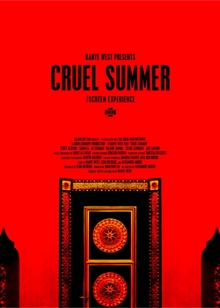
Cruel Summer (film)
Cruel Summer is a short film written and directed by American rapper Kanye West that premiered at the Cannes Film Festival in 2012,[4][5] and was shown out of competition.[6]
Cruel Summer
Kanye West
Elon Rutberg[1]
Kanye West
Elon Rutberg[1]
Alexandre Moors[1]
- Jonathan Lia
- Alex Rosenberg
(Executive Producer) - Amanda Palmer
(Executive Producer)
Kanye West[2]
35 minutes[3]
A custom pyramid-shaped screening pavilion was constructed for the film's debut, designed by conceptual firms DONDA, OMA and 2x4. The theater featured seven screens – three in the front, one on the floor, one on the ceiling and one on both the right and left side of the space. Cruel Summer was shot using a specialized camera rig, which allowed the directors to capture multiple angles simultaneously. This style of filming and screening a movie has since become known as the "Seven Screen Experience".[7]
The film is inspired by the album of the same name by West's record label GOOD Music.[8] It has been described as a "fusion of short film and art", with the Los Angeles Times raving Cruel Summer has a "thumping surround-sound quality that makes a 3-D Michael Bay effort feel like an iPad short."[9]
Synopsis[edit]
Rafi (Scott Mescudi), a high-end car thief, falls in love with a blind Arabian princess whose father (Ali Suliman) will only allow them to wed if he can pass a series of three challenges. Loosely based on old Arabian folk tales, the story culminates in a final challenge where Rafi must cure the Princess of her blindness in order to gain her companionship.[10]
Reviews[edit]
Cruel Summer received positive reviews.[13] The Hollywood Reporter called the film "groundbreaking" and exclaimed "It turns out Kanye West didn't just want to make a short film -- he wants to completely change the way movies are watched."[14] The Los Angeles Times wrote the film has "new music from West and a thumping surround-sound quality that makes a 3-D Michael Bay effort feel like an iPad short. "Cruel Summer" was shot with multiple cameras, with each screen offering a different perspective on the action."[9] Rolling Stone commented the piece has "plenty of striking imagery" and praised West's "great visual sense".[13]